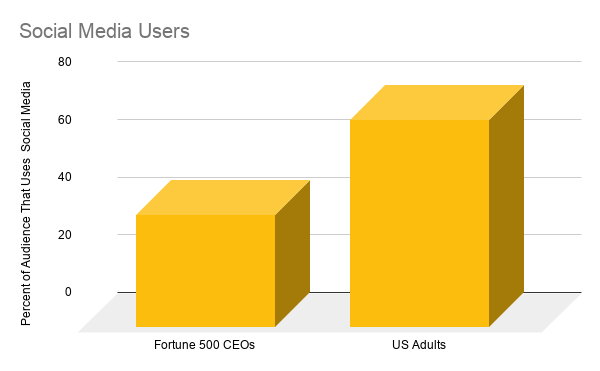Tattooing has been practiced throughout the world for many centuries and still remains as one of the most popular forms of self-expression. Tattoos are beloved for their ability to showcase valued ideas without the need for much explanation.
What would happen if we took the idea of a traditional ink-on-skin tattoo and compared that to a social media profile? As preposterous as it sounds, each present similar outcomes: both deliver impactful first impressions, both establish an individual’s purpose, and both create long-lasting perceptions. With a strong mix of first impressions and enduring influence, it would make sense that social media usage would be a priority among current leaders. But if that is what you were expecting, you would be wrong.

High-Profile Leaders Engage in Social Media Less Than the Average Adult
As technology and mobile adaptation continues to fuel social growth, we’ve reached a point of high saturation where 72 percent of adults use social media. However, when looking at Fortune 500 CEOs that percentage rapidly declines to 39 percent.
While the majority of leaders reject social media to build their personal brand and see no benefit for their company, other leaders are actively leveraging social media to increase their access, transparency and maximize audience reach. Social media has caused a monumental shift in the language of business, and every leader needs to be fluent or they will be lost in the conversation.
To become fluent, leaders first need to understand the power that their personal brand exudes for themselves and their company. In a survey of 1,700 executives, many believe that a CEO’s personal brand will become more important than the brand itself.
In a survey of 1,700 executives, many believe that a CEO’s personal brand will become more important than the brand itself.
To highlight this statistic, well-known business leaders already recognize the importance of personal branding through social media and currently outpace their own brands. Hover over the images or swipe up for social media metrics.
Properly leveraged social profiles have massive power for building and influencing brand loyal audiences. Forbes research shows that a CEO’s reputation is directly responsible for 44 percent of a company’s market value. As business models evolve to accommodate greater connection and transparency, it’s imperative that leaders be front and center as it often doesn’t just affect their individual brand but their companies as well.
Forbes research shows that a CEO’s reputation is directly responsible for 44 percent of a company’s market value.
The Four Core Truths When Engaging in Social Media
Many case studies have been conducted on this subject – each with varied opinions and conclusions – uncovering four core truths that leaders accomplish when investing in their personal brand through social media.
Increases Accessibility and Transparency
- Leaders who invest in social media increase their accessibility and transparency. By giving instant access, audiences quickly understand what that leader embodies, leading to one of the most important aspects of business building: human trust and understanding.
Establishes Thought Leadership
- Open access often leads to audiences finding quality content shared by each leader. As more content is consumed by these audiences, thought leadership starts to emerge, allowing leaders to be known as industry experts among their followers and outside groups.
Improves Company Reputation and Awareness
- By allowing access and building trust through thought leadership, leaders often see their company’s reputation and awareness levels increase as well, which affects company trust and market values.
Attracts Quality Talent
- Within a competitive environment of attracting talent, leaders are finding that top-tier applicants often start with researching the company’s leaders as opposed to starting with the company itself.
3 Segments to Focus on When Building and Maintaining a Personal Brand
To accomplish these four core truths, research revealed that leaders operated exclusively within three main segments to build their personal brand: Passion, Expertise and Consistency. Regardless of demographic or industry, each of the three segments were always represented and in no situation was a segment ever absent.
Leaders exclusively operate within three main segments to build and maintain their personal brand: Passion, Expertise and Consistency.

Passion
Leaders excelled in expressing their passions. A key point to highlight was that not every post referenced business. A large majority of leaders included content regarding community, entertainment and family. Higher engagement scores and follower counts point to leaders with genuine transparent passions as opposed to generic shared content.
Expertise
As business language becomes more topical and easier to access, audiences need to have confidence in a leader when they connect. Of the top executives researched, each increased their engagement and brand loyalty through trusted thought leadership – mostly through shared industry news or concise thinking and reflection.
Consistency
To remain top-of-mind and increase long-term trust, leaders were disciplined in their consistent postings. While many differed in their totals, researched leaders averaged two to three posts per week. A key finding to mention is that while consistency is important, quality still matters. Leaders who posted higher generic content received less total engagement than leaders who posted less but higher quality content.
What Do Your Tattoos Say About Your Brand?
Personal branding within social channels is not a fad that will quickly fade. It’s the new standard for business language and offers many influential benefits for both individual leaders and associated companies. While tattoos have been around for centuries, we’re seeing a new wave of tattoos emerge within the digital ecosystem: prominent digital tattoos built by social sharing, community trust and brand loyalty.
What does your digital tattoo say about you?

